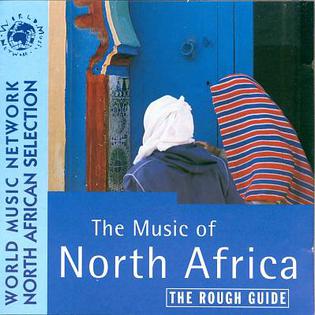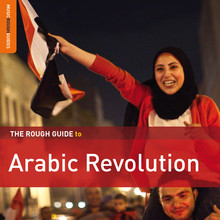
Yellow Magic Orchestra is the first official studio album by Japanese electronic music band Yellow Magic Orchestra, who were previously known as the Yellow Magic Band. Originally released by Alfa Records in Japan in 1978, the album was released by A&M Records in Europe and the United States and Canada in early 1979, with the US version featuring new cover art but without the closing track of "Acrobat". Both versions would later be re-issued in 2003 as a double-disc format, with the American version as the first disc.
Gidi Gidi Maji Maji is a Kenyan hip hop duo from Nairobi. Its two members are Maji Maji and Gidi Gidi. Their lyrics are mostly in Luo language, with some English and Swahili. Unlike most local hip hop artists, GidiGidi MajiMaji do willingly mix African rhythms with their music. According to popular entertainment guide Ghafla, their music is a "fusion of hip hop/rap and African music [which] they mostly sing and rap in their native language called Luo."
Arabic hip hop is hip hop music and culture originating in the Arabic-speaking world. It is performed in Arabic, English, French, Berber languages (Tamazight), and local Arabic dialects. Like most artists of the genre, the artists from the Arab world are highly influenced by American culture.

Ramon Goose is an English guitarist, singer and producer, known for his work with the West African Blues Project and the hip hop blues band NuBlues, for his mastery of the slide guitar, and for producing albums for American blues artists. As a solo artist he has toured across the world performing concerts and released several albums to critical acclaim.

The Source Presents: Hip Hop Hits is the first annual music compilation album to be contributed by The Source magazine. Released on December 16, 1997 and distributed through Polygram Records, Hip Hop Hits: Volume 1 features eighteen hip hop and rap hits. Five tracks on the album had reached number-one on the Billboard Hot Rap Tracks chart: "Bow Down," "Can't Nobody Hold Me Down", "Crush on You," "Elevators" and "Hypnotize". Two of the songs, "Hypnotize" and "Can't Nobody Hold Me Down" reached number-one on the Billboard R&B/Hip-Hop and pop charts.

Hossam Ramzy was an Egyptian percussionist and composer. He worked with Western artists like Jimmy Page and Robert Plant, Siouxsie Sioux, as well as with Arabic music artists like Rachid Taha and Khaled.

Ramy Essam is an Egyptian musician. He is best known for his appearances in Tahrir Square in Cairo during the Egyptian Revolution of 2011. Ramy is one of the few singers in Middle East to sing hard rock.
World Music Network is a UK-based record label specializing in world music.

The Rough Guide To The Music Of Afghanistan is a world music compilation album originally released in 2010. Part of the World Music Network Rough Guides series, the release covers a wide breadth of the music of Afghanistan on Disc One, and contains a "bonus" Disc Two highlighting the Ahmad Sham Sufi Qawwali Group. The album was compiled by Simon Broughton, editor of world music magazine Songlines, who also compiled The Rough Guide to the Music of Central Asia.

The Rough Guide To Desert Blues is a world music compilation album originally released in 2010. Desert blues refers to the music of the Mandinka and related nomad groups of the Sahara, who perform a style of music considered the root of the American Blues genre. This was first popularized in the West by Ali Farka Touré and has more recently been carried by a new wave of artists such as Tinariwen.

The Rough Guide To Psychedelic Africa is a world music compilation album originally released in 2012 featuring 60s and 70s African popular music. Part of the World Music Network Rough Guides series, the album contains two discs: an overview of the genre on Disc One, and a "bonus" Disc Two highlighting Victor Uwaifo. Disc One features three Nigerian tracks, two Guinean, and one each from Benin, Ethiopia, Tanzania, Senegal, Ghana, and Mali. The compilation was compiled by Dominic Raymond-Barker and Phil Stanton, co-founder of the World Music Network.

The Rough Guide To Voodoo is a world music compilation album originally released in 2013 featuring music inspired and influenced by the Voodoo religious tradition. Part of the World Music Network Rough Guides series, the album contains two discs: an overview of the genre on Disc One, and a "bonus" Disc Two highlighting Erol Josué. Disc One features four American tracks, two each from Brazil, Haiti, and Cuba, and one each from Trinidad and Benin. The collection was compiled by Dan Rosenberg and was produced by Phil Stanton, co-founder of the World Music Network.

The Rough Guide to the Music of Senegal is a world music compilation album originally released in 2013. Part of the World Music Network Rough Guides series, the release presents an overview of the music of Senegal on Disc One, and contains a "bonus" Disc Two highlighting Daby Balde. The album was compiled by Daniel Rosenberg and was produced by Phil Stanton, co-founder of the World Music Network. Daniel Rosenberg and Rachel Jackson wrote the sleeve notes, and Brad Haynes was coordinator and designer.

The Rough Guide to the Music of North Africa is a world music compilation album originally released in 1997. Part of the World Music Network Rough Guides series, the album contains five Algerian tracks, five Egyptian, two Sudanese, and two Moroccan, focusing mainly on modern music but including some traditional works. The compilation was produced by Phil Stanton, co-founder of the World Music Network.

The Rough Guide to African Disco is a world music compilation album originally released in 2013 featuring mainly 1970s and '80s African disco. Part of the World Music Network Rough Guides series, the album contains two discs: an overview of the genre on Disc One, and a "bonus" Disc Two highlighting Cameroonian artist Maloko. Disc One features five South African tracks, four Nigerian, two Ghanaian, and one each from Cameroon and France. The release was compiled by Dominic Raymond-Barker and Phil Stanton, co-founder of the World Music Network.

The Rough Guide To Acoustic Africa is a world music compilation album originally released in 2013 featuring acoustic music spanning Sub-Saharan Africa. Part of the World Music Network Rough Guides series, the album contains two discs: an overview of the genre on Disc One, and a "bonus" Disc Two highlighting griot Noumoucounda Cissoko. Disc One features artists hailing from Niger, Madagascar, the DRC, South Africa, Lesotho, Mozambique, Zimbabwe, Ghana, Cameroon, Mali, South Sudan, Sudan, Senegal, and Guinea. All but three tracks are guitar-based. The extensive liner notes were written by Daniel Rosenberg, and Phil Stanton, co-founder of the World Music Network, produced the album.

The Rough Guide to the Music of Ethiopia is a world music compilation album originally released in 2012. Part of the World Music Network Rough Guides series, the release contains two discs: an overview of the music of Ethiopia—focusing mainly on 21st century pop—is found on Disc One, while Disc Two features dub-style musician Invisible System. The compilation was curated by Dominic Raymond-Barker and Phil Stanton, co-founder of the World Music Network, who was also the producer. It is the second compilation by this name: the first volume, focusing on music of the 1960s, was released in 2004.

The Rough Guide to the Music of Morocco is a world music compilation album originally released in 2012. Part of the World Music Network Rough Guides series, the release contains two discs: an overview of the music of Morocco—featuring such genres as Chaabi and Malhun—is found on Disc One, while Disc Two features the modern rural-urban fusion band Groupe Mazagan. The compilation was curated by Andy Morgan, former manager of Tinariwen and organizer of the Festival in the Desert. Brad Haynes and Rachel Jackson coordinated the project, and Phil Stanton, co-founder of the World Music Network, was the producer.

Rhythm-Time: World Percussion is a world music compilation album originally released in 1999. Part of the World Music Network Rough Guides series, the release features percussion, ranging from Brazilian batucada to Japanese taiko music. The compilation was produced by Phil Stanton, co-founder of the World Music Network, in partnership with New Internationalist magazine.
"Irhal" (إرحل) is a song by the Egyptian musician Ramy Essam, released in 2011. It was entirely composed by Ramy Essam and exhibits poetic lyrics which illustrate the public's frustration with the current political circumstances in Egypt. Its title is directly translated, in English, as "Leave", being that its message is aimed at expressing the youth's displeased attitude towards President Mubarak's dictatorial regime. "Irhal" famously became the anthem of the Egyptian protests in Tahrir Square. Many believe that Mubarak's resignation was much attributed to the popularity, and the strong message that spread, due to a YouTube post that instantly went viral after its release.
















